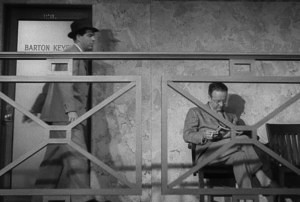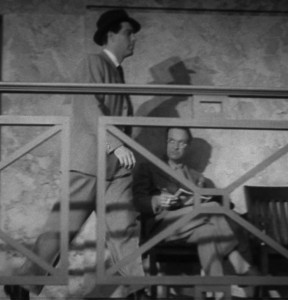 Author Raymond Chandler’s impact on detective fiction is greater than just his seven groundbreaking novels and the films that were made from them. Chandler also briefly worked as a screenwriter in Hollywood, teaming with director Billy Wilder to hammer James Cain’s novel Double Indemnity into the film noir classic it is known as today.
Author Raymond Chandler’s impact on detective fiction is greater than just his seven groundbreaking novels and the films that were made from them. Chandler also briefly worked as a screenwriter in Hollywood, teaming with director Billy Wilder to hammer James Cain’s novel Double Indemnity into the film noir classic it is known as today.
By all accounts, the two did not get along at all. It was in Mid-May, 1943 when Chandler was asked to come in to meet with Wilder about working on adapting Cain’s novel. Wilder was impressed with Chandler’s keen ear for dialogue, but that turned out to be all that he was impressed with. Chandler wasn’t much taken with Wilder’s demeanor either.The novelist found himself ill at ease once he was submerged in the film factory culture. He didn’t like to be flattered and he had little tolerance for pretension, the twin coins of the realm in Hollywood.
After working on a first draft of the script for five weeks, Chandler handed it in to Wilder who read it and then literally threw it back at the author, saying that it was no good. Wilder insisted that the two hole-up in an office and work on the script together. Chandler had never written in collaboration with anyone and found it a rough process. At one point, he refused to come to work until Wilder apologized for a long list of grievances.
Whatever personality clashes the two may have had, Wilder knew enough to keep Chandler around once filming began, giving Chandler final approval over any dialogue changes. Chandler reportedly was on set every day, silently observing the proceedings from the sidelines. And once, as we now know, from in front of the camera.
 It strikes me as strange that Chandler, who was famously reclusive and publicity-shy, would acquiesce to a brief on screen cameo. But there he is, approximately 16 minutes into the film, sitting in the hallway of the company Fred MacMurray’s insurance salesman Walter Neff works for, looking up from a paperback as Neff passes by.
It strikes me as strange that Chandler, who was famously reclusive and publicity-shy, would acquiesce to a brief on screen cameo. But there he is, approximately 16 minutes into the film, sitting in the hallway of the company Fred MacMurray’s insurance salesman Walter Neff works for, looking up from a paperback as Neff passes by.
Amazingly, there is no record of either Wilder or Chandler ever mentioning the cameo. Did it come about during a rare moment when the two were feeling more amicable than adversarial with each other? Did Wilder strong-arm Chandler into it? Unless someone discovers some previously unknown journal or correspondence from either party, we will probably never know.
Even more amazing is that it has taken this long to for someone to recognize Chandler in the scene. In this day when digital technology has allowed for every frame of a film to be scrutinized, it seems that something this obvious would have been detected already. It wasn’t until earlier this year, when two different bloggers, pointed out the author’s brief appearance.
Chandler would go on to fictionalize his impressions of the movie business in his 1949 novel, The Little Sister. There’s a Hollywood agent who paces in his office waving a Malaca cane, something that Wilder had done to Chandler’s annoyance during their collaboration. For his part, Wilder’s next film was The Lost Weekend, which some have suggested may have been the director’s attempt to understand the alcholism that Chandler fell into during his time as a screenwriter.
Via The Guardian.



Anyone in doubt or who wants to fulfill their own curiosities can tune in later tonight (6/13) to TCM for a 10:00 showing.